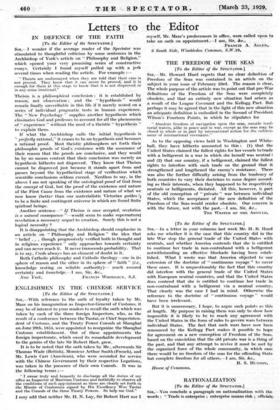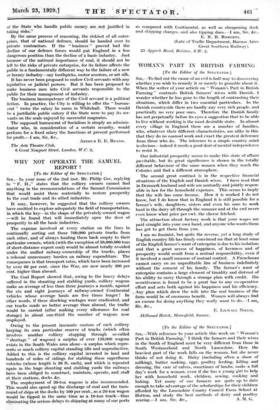RATIONALIZATION
[To the Editor of the SPECTATOR.]
SIR,—You conclude a paragraph on nationalization with the words : Trade is enterprise ; enterprise means risk ; officials of the State who handle public money- are, not justified in taking risks."
By the same process of reasoning, the riskiest of all enter- prises, that of national defence, should be handed over to private contractors. If the " business " proved bad the decline of our defence forces would put England in a less dangerous position than the decline of a basic industry. Just because of the national importance of coal, it should not be left to the risks of private enterprise, for its failure affects the public in a fundamentally different way to the failure of a new or luxury industry—say toothpicks, motor scooters, or art silk.
It has never been proposed to endow Civil servants with any legislative or judicial powers. But it has been proposed to make business men into Civil servants responsible to the public for their management of industry.
The business incompetence of the Civil servant is a political fiction. In practice, the City is willing to offer the " bureau- crat " twice the salary he earns in Whitehall. There would be a justifiable public outcry if the State were to pay its ser- vants on the scale enjoyed by successful magnates.
The supposed bureaucrat of Socialism is simply an adminis- trator who, in consideration of a certain security, would perform for a fixed salary the functions at present performed for profit.—I am, Sir, &c.,
ARTHUR E. E. READE.
The Arts Theatre.Club,
6 Great Newport Street, London, W.C. 2.

















































 Previous page
Previous page